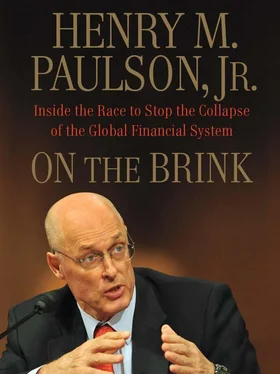The Fed had no authority to guarantee an investment bank’s trading book, or for that matter any of its liabilities. And without an acquirer with a big balance sheet to ensure solvency, a Fed liquidity loan would not have been sufficient to hold Lehman together during a shareholder vote. Instead, the Fed would have been lending into the same kind of run on Lehman that Bear suffered before JPMorgan came through. In the 30 to 60 days that could elapse before a shareholder vote, account balances would drain; huge amounts of collateral would be pulled as trades were unwound while hedge funds and other key customers fled; bank employees would quit. And then, most likely, Barclays shareholders would vote the deal down. The Fed would find itself in possession of an insolvent bank and out tens of billions of dollars.
I delivered the bad news to Josh Bolten, who had already spoken to the president about the possibility of a Lehman failure.
“You’ve got presidential approval to settle on a wind-down that doesn’t commit federal resources,” Josh told me. “Anything else, you should come back to the president and tell him what you’re planning.”
Tim, Chris, and I were running late for our scheduled 10:00 a.m. meeting with the CEOs downstairs. Believing we shouldn’t sugarcoat the situation, I told the bank chiefs we had run into some regulatory issues with Barclays but were committed to working through them.
The CEOs presented us with a term sheet for the deal. In the end, they had come much further than Tim and I thought they would. They had agreed to put up more than $30 billion to save their rival, and they had figured out how to spread the risk across the industry. If Barclays had committed to the deal, we would have had industry financing in place.
Tim asked the group to keep plowing ahead, but I imagine everyone suspected that the deal was in jeopardy.
At 11:00 a.m. I went back upstairs, and within half an hour I was on the phone with Alistair Darling, who wanted a report on Lehman. I told him that we were stunned to learn that the FSA was refusing to approve the Barclays transaction. I pointed out that we had run out of options for Lehman, because U.S. officials had no statutory ability to intervene.
He made it clear, without a hint of apology in his voice, that there was no way Barclays would buy Lehman. He offered no specifics other than to say that we were asking the British government to take on too big a risk, and he was not willing to have us unload our problem on the British taxpayer. Alistair’s chief concern was the impact of a Lehman failure on the British financial system. He wanted to know what the U.S. would do once Lehman failed.
“We are very concerned over here,” he said. “Lehman has a significant business in the U.K., and we have real concerns as to whether it is adequately capitalized.”
The chancellor of the Exchequer was delivering a clear message: we would get no help from the British. Our last hope for Lehman was gone.
I hung up feeling deflated, and frustrated that we had wasted so much time with Barclays on a deal that could never have been done. I was frustrated, too, that unlike Barclays, the British were not simply asking directly that the Fed guarantee Lehman’s trading book, even if the Fed lacked that power. Frankly, I was beginning to believe that the British were afraid that if they did push, the Fed would somehow find a way to guarantee it, leaving them one less excuse for not approving the deal.
I could only surmise that if Darling wasn’t presenting any options or leaving any room to negotiate, it was because the British had their reasons for not wanting this deal done. In truth, I could understand their hesitation. The U.K.’s bank situation was more perilous than ours. Altogether, British banks’ assets amounted to more than four times the size of the national GDP; total U.S. banking assets were about the same size as our GDP. Moreover, individual U.K. banks, including Barclays, had capital issues of their own. It was understandable that the country’s officials might be reluctant to waive normal shareholder procedures for a deal that could have resulted in big losses to one of their largest institutions while carrying no risk for the U.S. government.
“Darling’s not going to help,” I told Tim. “It’s over.”
At that moment, I did not have time for regret, recriminations, or second-guessing. I could only think about the enormous challenge we faced.
I’d asked John Thain to come up to see me, and he arrived right after my conversation with Darling. I got to the point: “Have you done what I recommended and found a buyer?”
“Hank, I’m not thick,” he responded, slightly irritated. “I heard you. I’m doing what I need to do.”
John didn’t mention Bank of America, but I did. By this point I assumed he was in serious negotiations to sell Merrill to the bank, and I said he should focus on doing that deal.
John’s no actor, and I could tell he was deeply engaged in merger talks. I was relieved: with Lehman all but finished, I didn’t want to see Merrill dragged down next.
I phoned my Treasury team in Washington to brief them on the unhappy developments with Lehman and warn them that the markets were going to get very choppy. I asked Kevin Fromer to get ready to talk to the appropriate staffs on the Hill, and I made sure that Michele Davis was prepared to deal with the press, which was expecting a big announcement on Lehman before the Asian markets opened.
All weekend Dick Fuld had been holed up at Lehman headquarters, making phone calls. Now I called him back.
“Dick, I feel terrible,” I said. “We’ve come up with no options. The British government is not going to let Barclays go ahead. BofA isn’t interested.”
“This can’t be happening,” he said. “Hank, you have to figure something out!”
Fuld couldn’t understand that the BofA deal was gone. It was impossible not to sympathize with him. After all, I had run a financial institution; he had been one of my peers. I couldn’t help thinking what this would mean for the thousands of people who worked for Lehman Brothers, one of whom was my brother, Dick.
Fuld had also been calling Tim and Ben, but only I talked to him. Although I hadn’t been directly involved in the discussions between Barclays and Lehman, I knew that he had been shunted aside and that Lehman president Bart McDade had taken over the negotiations.
We’d scheduled another meeting with the CEOs for 12:30 p.m., but once again we were running late, because Tim was back on the phone with Callum McCarthy, fighting to the end for a Barclays-Lehman deal. I stood beside him, watching him jot notes on a pad—calm and methodical as always, although he must have been as frustrated as I was. He was pressing McCarthy about his reasoning and asking if there was anything that could be done to speed the FSA’s deliberations up or to get the deal done.
And then Tim hung up.
“I made no progress,” he said simply. The FSA continued to be unwilling to say what it would take to approve the deal.
With that, we walked to the elevators. To reach the conference room, we had to wade through all the Wall Street executives milling around the first floor. It was like pushing through a crowd at a stadium. Everyone, it seemed, wanted to speak to us. They were working hard and were eager for an update, and I felt as though they were all scanning my face or Tim’s to guess the verdict. I wish I could have been buoyed by their energy and effort, but I felt numb. The news I was about to deliver could only hurt them. Some of the crowd tried to follow us into the conference room, but we shut the door on them, limiting the meeting to the CEOs.
It was shortly before 1:00 p.m. when Tim, Chris, and I addressed the CEOs again. I was completely candid. Barclays had dropped out, and we had no buyer for Lehman. We were going to have to make the best of it.
Читать дальше












